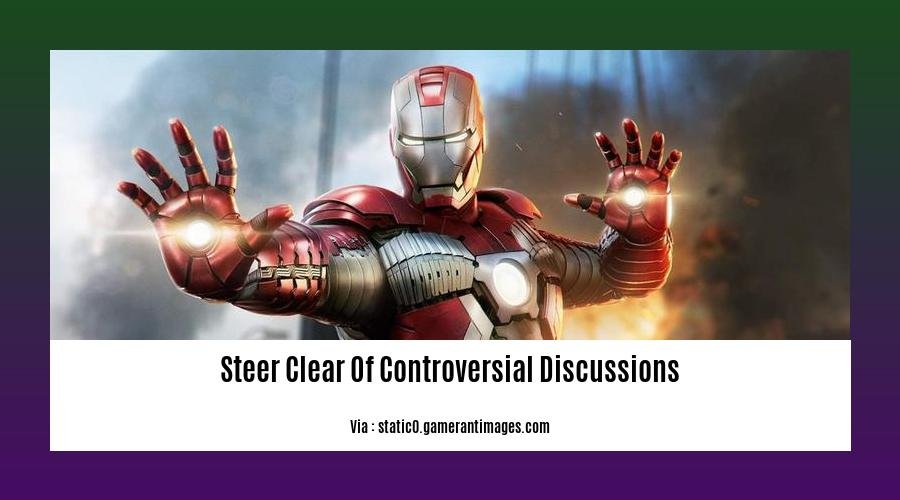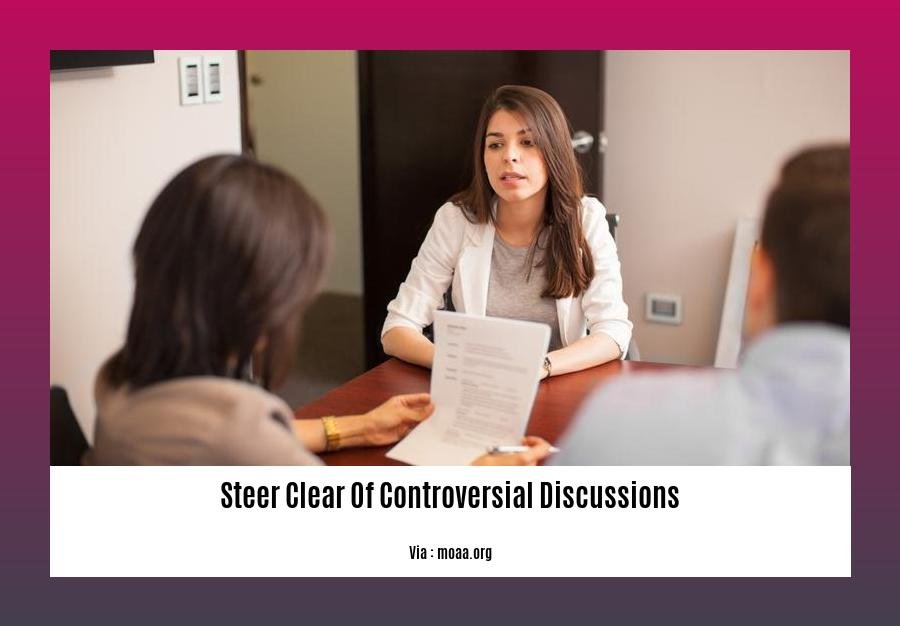Embark on a journey toward constructive dialogue with “Steer Clear of Controversial Discussions for Constructive Dialogue.” This article will guide you through strategies to navigate sensitive topics and foster meaningful conversations.
Key Takeaways:

- Steer clear of unpleasant, dangerous, or problematic discussions.
- Maintain neutrality and objectivity when discussing controversial topics.
- Avoid expressing controversial opinions in professional settings.
- Utilize effective communication techniques to navigate controversial situations.
Steer Clear of Controversial Discussions
In a world brimming with contrasting opinions, steering clear of controversial discussions becomes increasingly important. Whether it’s the dinner table or the workplace, navigating sensitive topics requires finesse.
Understanding Controversy
- Know that controversy arises when topics elicit strong emotions or clash with deeply held beliefs.
- Politics, religion, race, and social issues are common triggers.
Strategies for Avoiding Controversy
- Be aware of your biases. Understanding your own perspective helps avoid knee-jerk reactions.
- Practice active listening. Allow others to express their views without interrupting or dismissing them.
Strategies for Defusing Controversy (If Un avoidable)
- Remain calm and respectful. Avoid escalating the situation with anger or insults.
- Ask clarifying questions. Seek a deeper understanding of others’ viewpoints.
- Acknowledge different perspectives. Show that you value all opinions, even if you don’t agree with them.
- Use “I” statements. Express your own feelings and perspectives without attacking others.
Benefits of Avoiding Controversy
- Preserves relationships. Protects bonds with people who may have different views.
- Reduces stress and anxiety. Prevents the emotional toll of heated debates.
- Fosters respectful dialogue. Creates a more inclusive and welcoming environment.
Remember, it’s possible to disagree respectfully without creating division or conflict. By steering clear of controversial discussions and engaging in constructive communication, we can cultivate a more harmonious and understanding society.
The quickest way to make a good impression on a first date is to avoid the conversation topics to avoid. Talking about your exes or politics is often considered a no-go subjects like exes and politics. It’s best to focus on neutral topics that will help you get to know each other better. If you find yourself discussing politics during a first date, try to keep your opinions to yourself and instead ask your date about their views. If they seem interested in discussing politics, you can agree to disagree and move on to another topic. The goal is to have a fun and enjoyable first date, so it’s best to avoid topics that could lead to conflict. Instead, focus on finding sensitive matters to sidestep gracefully and keeping the conversation light and fun.
Strategies for Defusing Controversy
Understanding the Triggers
Let’s face it, conversations can get heated quickly, especially when we touch on delicate topics. Understanding what triggers these controversies can help us navigate them with more ease. Politics, religion, race, and social issues – these are common hot buttons.
The Power of Active Listening
When someone is expressing a view that rubs you the wrong way, resist the urge to interrupt or dismiss them. Instead, practice active listening. Show them that you’re trying to understand their perspective, even if you don’t agree with it.
Stay Calm and Use “I” Statements
Strategies for Defusing Controversy:
- Stay calm and respectful. Don’t let emotions hijack your words.
- Ask clarifying questions. Seek to understand different viewpoints.
- Acknowledge different perspectives. Show that you value all opinions.
- Use “I” statements. Express your own feelings without attacking others.
- Seek compromise or mediation. Explore solutions that address all concerns.
The Benefits of Staying Neutral
Avoiding controversy isn’t about shying away from important conversations. It’s about fostering respectful dialogue that leads to understanding, not division.
Key Takeaways:
- Understanding trigger points helps avoid or defuse controversial topics.
- Active listening demonstrates respect and fosters understanding.
- Staying calm, asking questions, and acknowledging different perspectives are key to defusing controversy.
- Using “I” statements and seeking compromise promote constructive dialogue.
- Avoiding controversy preserves relationships, reduces stress, and fosters respectful dialogue.
Forbes: Why Controversy Can Be Costly for Brands
Benefits of Avoiding Controversy
Have you ever found yourself in a heated debate that left you feeling stressed and frustrated? Engaging in controversial discussions can be divisive and unproductive, leading to misunderstandings and broken relationships. It’s like walking on a tightrope, where one wrong step can send you tumbling down.
Understanding the Benefits of Avoiding Controversy:
- Preserves relationships: Engaging in controversial discussions can strain relationships with friends, family, or colleagues who hold different views. By avoiding these discussions, you can protect and nurture your important connections.
- Reduces stress and anxiety: Controversial discussions can be emotionally taxing, causing stress and anxiety. By steering clear of these topics, you can create a more peaceful and harmonious environment for yourself and others.
- Fosters respectful dialogue: When you avoid controversial topics, you create a more inclusive and welcoming atmosphere where different perspectives can be shared and respected without judgment. It’s like opening a door to understanding and empathy.
Strategies for Avoiding Controversy:
- Be aware of your biases: We all have biases that shape our opinions. Recognizing your own biases can help you approach controversial topics with an open mind and avoid making assumptions.
- Listen actively: Pay attention to others’ opinions without interrupting or dismissing them. Show them that you value their perspectives, even if you don’t agree with them. It’s like putting on a pair of listening glasses to hear the world from someone else’s point of view.
- Focus on common ground: Look for areas of agreement and emphasize shared values. By highlighting commonalities, you can build a bridge of understanding and reduce the likelihood of conflict. It’s like finding the intersection of two circles, where there’s overlap and potential for connection.
Key Takeaways:
- Controversy can damage relationships, increase stress, and stifle open dialogue.
- Avoiding controversial discussions can preserve connections, reduce anxiety, and foster respectful communication.
- Be aware of your biases, listen actively, and focus on common ground to navigate difficult conversations gracefully.
Citation:
- Mayo, M. (2023, March 14). Steer Clear of Controversy: How Retailers and Brands Can Avoid Disaster. First Insight.
Conclusion
Navigating contentious conversations with grace and respect is vital in today’s society. You can keep those discussions from getting divisive by:
Recognizing Conflict Triggers
- Understand what sparks controversies, such as religion, politics, and social issues.
Maintaining Productive Dialogue
- Listen actively, showing respect for others’ viewpoints.
- Seek common ground, finding areas of agreement and shared values.
- Change the subject politely if a topic becomes too tense.
- Set boundaries, respectfully declining to engage in certain discussions.
Defusing Heated Debates
- Stay calm and respectful, avoiding personal attacks or accusations.
- Ask clarifying questions, seeking deeper understanding of different perspectives.
- Acknowledge diverse opinions, showing you value them even if you disagree.
- Use “I” statements, expressing your own feelings and perspectives without attacking others.
- Explore compromise or mediation, seeking solutions that address multiple viewpoints.
Embracing the Benefits
- Preserve relationships, avoiding unnecessary conflicts that can strain personal bonds.
- Reduce stress, preventing the emotional toll of heated debates.
- Foster respectful dialogue, creating a more inclusive and welcoming environment.
Key Takeaways:
– Identify and respect different perspectives.
– Focus on common ground rather than differences.
– Use constructive communication strategies, such as listening, asking questions, and setting boundaries.
– Defuse heated debates with calmness, respect, and empathy.
– Avoid controversial discussions to preserve relationships, reduce stress, and promote respectful dialogue.
Citation: Writing a Research Paper Conclusion | Step-by-Step Guide

FAQ
Q1: What is the main reason to avoid controversial discussions?
A1: Controversial discussions can lead to division, misunderstandings, and can hinder constructive dialogue. It is important to approach sensitive topics with empathy and a willingness to listen to different perspectives.
Q2: How can I identify a controversial topic?
A2: Controversial topics are often characterized by strong opinions, differing viewpoints, and a lack of consensus. They can be related to politics, social issues, religion, or other sensitive areas where there is no clear right or wrong answer.
Q3: What are some tips for managing controversial discussions?
A3: When engaging in controversial discussions, it is important to stay calm, respectful, and non-judgmental. Focus on listening to others’ perspectives, asking clarifying questions, and seeking common ground. Avoid interrupting, making personal attacks, or dismissing opposing viewpoints.
Q4: What are the benefits of avoiding controversial discussions?
A4: Avoiding controversial discussions can help create a more positive and productive environment. It allows individuals to focus on shared goals, foster mutual understanding, and maintain relationships despite differences in opinion.
Q5: How can I navigate controversial discussions in a professional setting?
A5: In professional settings, it is generally advisable to avoid expressing controversial opinions. Instead, focus on presenting facts, data, and evidence-based arguments. Maintain a neutral tone, respect differing viewpoints, and be open to compromise and collaboration.










